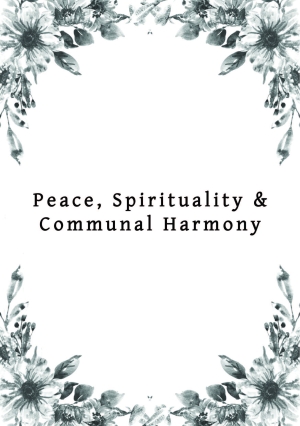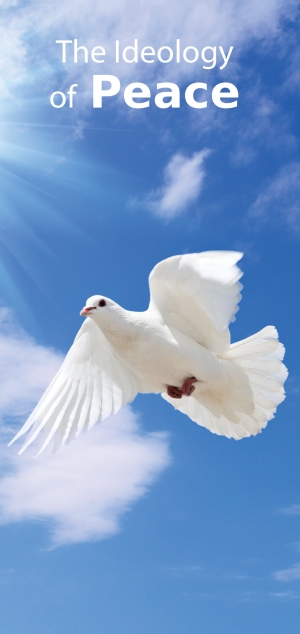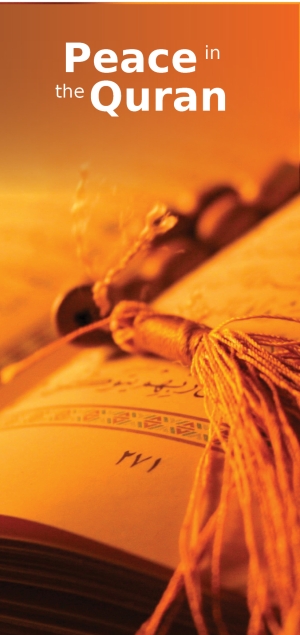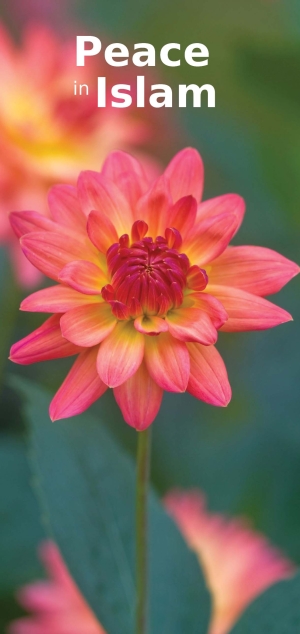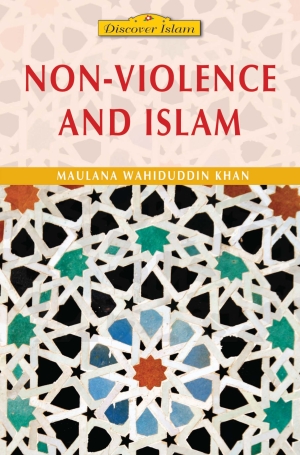Peace is not aimed at satisfying the concerned parties regarding rights and justice. The natural formula of peace is based on the principle: Peace for the sake of peace. The Prophet of Islam successfully demonstrated this in the form of the Treaty of Hudaybiyyah in 628 AD. The Prophet agreed to all the conditions demanded by his opponents to arrive at a ten-year no-war pact. The Peace Treaty did was that it stopped all kinds of hostility between the two sides and opened the doors of opportunity. After this, it became possible for dialogue and intellectual exchange between the two parties. So, peace opened the doors for the Prophet to be able to spread his message throughout Arabia. This remarkable success story serves as a model for developing a successful strategy for achieving peace and one’s desired goal.
This prophetic example shows us the way to peace. According to this law of nature, if we establish peace for peace by delinking peace from justice and establishing peace at any cost. It will open the doors of opportunity, and by availing of those opportunities, you can achieve justice, peace, or any other goal. We adopt peace for peace to re-plan our strategy, concentrating on opportunities and not on justice. By availing of the opportunities that arise, we can achieve peace and our desired goals like justice, human rights, or any other goal.
Featured Articles
Featured Videos
FAQs
Islam is a religion of peace in the fullest sense of the word. The Arabic root of Islam is ‘silm’ which means peace. The Quran calls its way ‘the paths of peace’ (5:16). It describes reconciliation as the best policy (4:128), and states that God abhors any disturbance of the peace (2:205).
A perusal of the Quran shows that most verses of the Quran (and also the Hadith) are based on peace and kindness, either directly or indirectly. The Quran states: ‘…Gods calls to the home of peace’ (10: 25). It is, thus, God’s will that men and women should jointly establish a society of peace in this world.
The Quran presents the universe as a model which is characterized by harmony and peace (36:40). When God created heaven and earth, He so ordered things that each part might perform its function peacefully without clashing with any other part.
In fact, Islam cannot afford not to be in a state of peace because all that Islam aims at—spiritual progress, intellectual development, character building, social reform, educational activities, and above all dawah—can be achieved only in an atmosphere of peace and harmony.
Source: The Man Islam Builds
Some people bracket justice with peace, but Islam does not subscribe to this notion. Islam believes in peace for the sake of peace. According to Islam, justice is not the direct result of peace. Peace only provides a framework within which we may work toward justice. There are so many examples in the life of the Prophet that prove that the Prophet never bracketed justice with peace.
He always took peaceful circumstances as an opportunity to work for justice and did not attempt to derive justice directly from peace. One such clear example is provided by the treaty of Hudaybiyyah, between the Prophet and his opponents. From the details of the peace treaty, it is clear that no clause regarding justice was included. Obviously, the conditions of this treaty were quite against justice. But the Prophet accepted this treaty, not because it was giving them justice, but because it was paving the way to work for justice.
According to Islam, peace is not simply an absence of war. Peace opens doors to all kinds of opportunities which are present in any given situation. It is only in a peaceful situation that planned activities are possible. It is for this reason that the Quran says, ‘reconciliation is the best’ (4:128). Similarly the Prophet Muhammad, may peace be upon him, has observed: “God grants to gentleness (rifq) what he does not grant to violence (unf). (Sunan Abu Dawud 4/255)
Source: The Man Islam Builds
The Quran tells us that “the sun is not allowed to overtake the moon, nor does the night outpace the day. Each in its own orbit runs.” (36:40)
For billions of years, therefore, the entire universe has been fulfilling its function in total harmony with His divine plan.
When God created the heavens and the earth, He so ordered things that each part might perform its function peacefully without clashing with any other part. For billions of years, therefore, the entire universe has been fulfilling its function in total harmony with His divine plan.
From this, we can understand that peace is no external commodity to be artificially imposed upon man. Peace is inherent in nature itself. The system of nature set up by God already rests on the basis of peace. If this system is not disrupted, it will continue to stay the course set for it by the Almighty. It is true that the only condition to maintain the human system on the path of peace is to keep it free from the elements of corruption. That is why the Quran states:
“Do not corrupt the land after it has been set in order.” (7: 85)
In order to preserve peace established by nature, two important injunctions have been laid down by Islam. One at the individual level, stresses the exercise of patience, and the other, at the social level, forbids taking the offensive.
Negative reaction on the part of the individual is the greatest factor responsible for disrupting peace in daily life. It repeatedly happens that in social life one experiences bitterness on account of others. On such occasions, if one reacts negatively, the matter will escalate to the point of a head-on collision. That is why Islam repeatedly enjoins us to tread the path of patience. The Quran says:
“Surely the patient will be requited in full without measure.” (39: 10)
The reason for the rewards for patience being so great is that patience is the key factor in maintaining the desired system of God. In the words of the Quran, the patient man is the helper of God. (61: 14)
Source: Spirit of Islam December 2018






